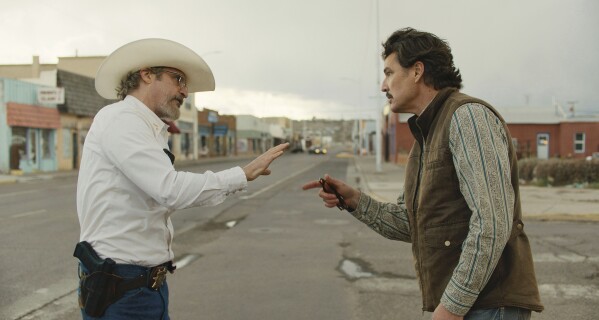If the beauty of the classic Western at least partially lies in its dependably simplistic morality — a villain doing wrong; and a hero stopping them cold — the modern “neo-western” as Ari Aster’s satirically topical film has often been classified, becomes almost the literal opposite: A film where morality shifts and scuttles about, before getting bludgeoned, shot, blown up, and, eventually paved over and turned into a high-tech office building.
The year is 2020, with the global Covid pandemic looming over everything, including Eddington, a small town (higher elevation than population) in New Mexico. The town is presided over essentially by two men, seemingly sitting on opposite sides of the proverbial barbed wire fence. Sheriff Joe Cross (Joaquin Phoenix), a taciturn man in perpetual cowboy hat who too often refuses the mask mandate on the one side, and the far more outgoing, socially conscious mayor, Ted Garcia (Pedro Pascal), seeking re-election largely on the strength of his pushing for a high-tech AI energy facility, on the other.
But, as is often the case with Aster, one of the better young American directors working today, things are a good deal more complex than they first seem. For one thing, even as the Sheriff balks at the mask mandate, he’s doing it not as a MAGA-ite contrarian, so much as an agent of compassion for people (not unlike himself, stricken with asthma) who have problems breathing through them. We see Joe at home with his manic depressive wife, Lou (Emma Stone), and conspiracy-baited MIL, Dawn (Deidre O’Connell), trying desperately to connect with the former, and tolerate the latter, treating his wife with tender care, even as she continually turns away from him.
Meanwhile, Garcia, living in his huge mayoral mansion is shown to be little more than a slick political opportunist, using his clout with the community to push this high-tech project on them for his own personal benefit, behind the skeezy manipulations of a conniving developer (King Orba) leading the way. There is also a more personal element between the two men: Two decades ago, Garcia dated Lou, while she was only 16, dumping her shortly after pushing her to get an abortion, an emotional upheaval that Joe strongly believes contributed to his wife’s crippling depression. Damningly, he puts this theory out on a deeply ill-advised Facebook post he makes spontaneously, shortly after deciding on the spur of the moment to run against Garcia as a candidate in the upcoming election.

There are several other resonating complications, including a suave, fully tattooed snake oil guru (Austin Butler), who seduces Lou with his talk of energy healing and grand conspiracies; a smaller romantic rivalry between Garcia’s high-school-aged son Eric (Matt Gomez Hidaka), and his friend, the ungainly Brian (Cameron Mann), who both vie for the romantic attention of Sarah (Amélie Hoeferie), a politically progressive young woman leading the local #BLM marches in town, who also happens to be the ex of one of Joe’s deputies, Michael (Michael Ward).
Everything hurtles breathlessly along at horrifyingly familiar social media speeds — Joe spends most nights curled up in bed in a fetal position, staring at his phone’s continual feed of shock, doom, and horror, just like the rest of us — until things spin completely out of control, and we’re left to sort through the blasted rubble and strewn about body parts to make sense of the chaos.
As an ode to our current times — as horrific as much of the film’s insightful social commentary is, it doesn’t take into account the even more agonizing years since the pandemic — it’s steeped in exactly the sort of devastating mayhem and hell-bent havoc we have reaped upon the world. Joe might have decent intentions at first, but he finally reaches a breaking point whereupon he hits upon a raging, immoral fury that enables him to do any sort of heinous act without regard to the lives he’s destroying.
The film met a very mixed reception at its premiere at this year’s Cannes festival, and it’s pretty easy to see why. Does it properly reflect the bedlam and madness of our time, or fall prey to it? Either way, it isn’t any sort of simplistic summing up, with a steady moral curve that we can recognize and hold onto, a la Rio Bravo or Shane, instead we get more or less what we deserve, a slippery, anarchic bit of madness that could just as easily serve as mankind’s epitaph.
The film ends on a long shot of Garcia’s newly built AI building, gleaming in the evening, lighting up an expanse of the desert with the rest of the mountains and the stars looming overhead. It’s an oddly static, tranquil image that utterly belies the bloodshed, madness, and human devilry that heaved it into existence. From this slightly more distant vantage point, it’s difficult as hell to see how we are anything other than doomed.


